- Home
- Iain Pears
The Portrait
The Portrait Read online
Table of Contents
Title Page
Copyright Page
Dedication
ABOUT THE AUTHOR
PRAISE FOR The Portrait
“The appeal of [The Portrait] lies in the intensity of its narrator’s growing sense of injustice as he recounts all the indignities that he has suffered over the years from a cruel critic whom he once considered a friend. He wants revenge now, but he wants it to come slowly.” —The Boston Globe
“A smart little psychological thriller . . . The film version—and there ought to be one—might feature Anthony Hopkins riffing off his Hannibal Lecter role while channeling the spirit of Kathy Bates’s crazed fan in Misery.” —The New York Times
“Mesmerizing . . . This is a novel of pitiless revenge.”
—The Washington Post Book World
“By the end of the novel, the boundaries between art and life are crossed in ways that are weirdly haunting.”
—The Baltimore Sun
“A fascinating work of high-minded literature written on a small canvas.” —Houston Chronicle
“A true tour de force . . . initially engaging and finally utterly chilling . . . an extraordinary work.”
—Library Journal (starred review)
“Pears, gracefully but mercilessly scraping layers of personalities away with a finely honed scalpel, plumbs the depths of [a] disturbing dynamic and raises all kinds of unsettling but necessary questions.” —The Providence Journal
“Much like Robert Browning in his classic dramatic monologues, Pears presents a classic unreliable narrator, although the degree of his unreliability is left tantalizingly ambiguous. . . . For those who prefer the subtlety of a small canvas, where the perfidy of the human heart is revealed in shadow, Pears’s ‘portrait’ is an exquisite little gem.”
—Booklist (starred review)
“Like the most potent works of art, The Portrait contains multitudes within its slender frame . . . the prose is as direct as a brushstroke. And when a sinister tone enters [the] narration, one can sense the raw, emotional impact that gathers like a violent storm. Richly evocative of its historical milieu, The Portrait is a study in presentation and rising drama that rewards multiple viewings. And readings.” —BookPage
PRAISE FOR
The Dream of Scipio
An ALA Booklist Editors’ Choice
“Braiding together parallel plots of romance and political intrigue set in Provence during three dark eras, The Dream of Scipio is a murder mystery on the grandest scale. . . . [Pears] invests his complex story with piquancy, irony, and humor. There is much to ponder here, from Neoplatonic philosophy to anti-Semitism to public duty. . . . Eye-opening.” —People
“Pears builds a multilayered tale of moral choice, love, danger, and loss. Like an archaeologist, he uncovers worlds beneath worlds in a few square miles of Provençal earth.”
—The New York Times Book Review
“The Dream of Scipio is not a mystery story. But it is a mysterious book, plumbing the shifting motives and passions of its perplexed characters and tracking the startling trajectories of ideas over the course of centuries. . . . Pears weaves back and forth, making it easier for the reader to grasp their parallels, contrasts, and ironies. His novel is roughly in the tradition of Umberto Eco’s The Name of the Rose, but it has more passion and urgency than Mr. Eco’s lighter, more playful work. The Dream of Scipio is complex, surprising, and thought-provoking, a dream of a novel in more senses than one.”
—The Wall Street Journal
“Pears could not have chosen a setting richer in beauty or in historical resonance. . . . The Dream of Scipio is an adventure and an achievement to match An Instance of the Fingerpost.”
—San Francisco Chronicle
“A dazzling triptych of love and ideas . . . Pears leaves us with a dream, not only of destruction, but of immense and unexpected heroism. Pears’s finest book yet, even more successful and riveting than its predecessor . . . immensely readable, fast-moving, and full of wonderful juxtaposition.”
—The Boston Globe
“Lucid and informative . . . audacious and sophisticated.”
—Los Angeles Times
“Erudite and highly readable . . . [Pears’s] fans will rejoice in The Dream of Scipio.” —USA Today
“An entirely satisfying symphony of story and substance . . . ingeniously imagined. Imagine a ropemaker, turning and twisting three fibers to make one immensely strong strand. Or perhaps a hairdresser, weaving three hanks of hair into an intricate and beautiful plait. Such is the ambitious structure of Iain Pears’s new novel . . . a book that begins as an admirable intellectual accomplishment, and becomes, in the end, a thrilling journey through history, into the human heart and soul.” —The Washington Post
“Iain Pears is everybody’s fantasy of the ultimate history teacher. . . . His popular mysteries, so intricately woven from the threads of the past, have given the genre more class and intellectual depth than it’s ever had. . . . This is another wildly entertaining novel. . . . Pears has constructed a kind of literary Rubik’s Cube, spinning these stories through each other in short chapters that produce fascinating patterns and parallels. . . . One of the dazzling pleasures of this novel is Pears’s ability to follow the bumblebee flight of an idea through the ravages of time . . . remarkable. . . . This is a novel for our time about all time. Those who ignore Iain Pears are doomed to repeat the past.”
—The Christian Science Monitor
“[An] ambitious, heartfelt, and thought-provoking book, one that should find a home in the heart of every thinking reader.”
—The Oregonian
“A dazzling hall of mirrors . . . a remarkable read, compulsive not only as a historical novel, but also as a genuine novel of ideas.”
—The Daily Telegraph (London)
“Iain Pears is a special kind of risk taker—a philosophical mystery writer with an uncommon talent for popularizing the obscure and arcane, and telling a hell of a story while doing it. . . . People who thought Pears could not top Fingerpost are going to be surprised. He did.” —New York Daily News
PRAISE FOR
An Instance of the Fingerpost
A New York Times Bestseller
A New York Times Notable Book
Named One of the New York Public Library’s
Books to Remember of 1998
“May well be the best historical mystery ever written.”
—The Boston Sunday Globe
“If you liked Umberto Eco’s The Name of the Rose, you should run to buy Iain Pears’s lavishly erudite historical mystery.”
—The New York Times
“Utterly mesmerizing . . . Iain Pears has written an impressively original and audaciously imaginative intellectual thriller. . . . Don’t miss it.” —The Washington Post Book World
“Fascinating . . . quite extraordinary . . . elevates the murder mystery to the category of hight art.”
—Los Angeles Times Book Review
“Enthralling . . . a gripping, expert, and wholly plausible journey to a singularly fascinating time and place.”
—San Francisco Chronicle Book Review
“Ingeniously plotted, briskly narrated, and intellectually supple . . . this thriller brings not merely a huge cast of characters but a whole century vividly to life.” —Newsweek
“[A] novel that will have you sitting up all night and calling in sick the next day. It’s that hard to put down. . . . A superior entertainment.” —Houston Chronicle
“An erudite and entertaining tour de force.” —People
“A whopping-good whodunit . . . [a] potent brew, good to the very last drop.” —Mirabella
“Fans of such mystery/history hybrids as The Name of the Rose and The
Alienist, pull up a chair and settle in.”
—Entertainment Weekly
THE BERKLEY PUBLISHING GROUP
Published by the Penguin Group
Penguin Group (USA) Inc.
375 Hudson Street, New York, New York 10014, USA
Penguin Group (Canada), 90 Eglinton Avenue East, Suite 700, Toronto, Ontario M4P 2Y3, Canada (a division of Pearson Penguin Canada Inc.)
Penguin Books Ltd., 80 Strand, London WC2R 0RL, England
Penguin Group Ireland, 25 St. Stephen’s Green, Dublin 2, Ireland (a division of Penguin Books Ltd.) Penguin Group (Australia), 250 Camberwell Road, Camberwell, Victoria 3124, Australia (a division of Pearson Australia Group Pty. Ltd.)
Penguin Books India Pvt. Ltd., 11 Community Centre, Panchsheel Park, New Delhi—110 017, India
Penguin Group (NZ), cnr Airborne and Rosedale Roads, Albany, Auckland 1310, New Zealand (a division of Pearson New Zealand Ltd.)
Penguin Books (South Africa) (Pty.) Ltd., 24 Sturdee Avenue, Rosebank, Johannesburg 2196, South Africa
Penguin Books Ltd., Registered Offices: 80 Strand, London WC2R 0RL, England
This is a work of fiction. Names, characters, places, and incidents either are the product of the author’s imagination or are used fictitiously, and any resemblance to actual persons, living or dead, business establishments, events, or locales is entirely coincidental.
Copyright © 2005 by Iain Pears
All rights reserved.
No part of this book may be reproduced, scanned, or distributed in any printed or electronic form without permission. Please do not participate in or encourage piracy of copyrighted materials in violation of the author’s rights. Purchase only authorized editions.
RIVERHEAD is a registered trademark of Penguin Group (USA) Inc.
The RIVERHEAD logo is a trademark of Penguin Group (USA) Inc.
eISBN : 978-1-440-68501-9
1. Portrait painters—Fiction. 2. Brittany (France)—Fiction. 3. Art critics—Fiction.
4. Islands—Fiction. I. Title.
PR6066.E167P
823’.914—dc22
http://us.penguingroup.com
To Alex
Well, well, well. Come in, my dear fellow. Let me look at you. But first, an embrace; it is not often you see an old friend for the first time in nearly four years. You’ve not changed a bit. Well, of course I’m lying. The eyes are that little bit more lined, the skin has lost some of its texture, the hair is a touch more grey. We are both past our best. But at least you’re still slim, to the point of emaciation. How you can eat so much to so little effect never ceases to astonish. The differences between us grow year by year, as you undoubtedly noticed the moment you saw me.
I must confess I was disturbed when I received your proposal last month. I thought, to begin with, that it was a bad idea. I could hardly believe you were prepared to travel all this way just to see me. Hence my cautious reply, in case you were making sly fun of me. My years of exile have made me sensitive, as you will no doubt discover. But here you are, a figure from history itself—my history, at least, as I suppose you are still very much in the centre of things back in London.
A glass of wine to toast your arrival. The pick of the Luberon. A particularly good year, 1912, as I am sure you will agree, especially when carefully aged for nearly nine months. I joke, of course. I like the stuff, but hardly expect your sophisticated palate to be equally enthusiastic. It is all sun and earth; no artifice in its production whatsoever. Dark, strong and somewhat violent—a little like the people who make it, in fact. I’ve grown used to the taste; it makes a change from the beer and cider that are the staples hereabouts, and fine vintages would be wasted on me, even if you could get them. I have a barrel brought over on the boat every month or so and drink it until it turns to vinegar. Already has, you think? No; it’s meant to be like that—or if it isn’t, few on this island know any better. This is the wine of the peasantry, the fuel of France. Drink it and you become like them. Don’t say you haven’t been warned.
Sit down, then. I know, not comfortable, but it is the cleanest and best chair I have. Besides, it will suit my purpose admirably, as you will see. I have been made nervous, even irritated, by your sudden arrival on my little island. Do you know how long it is since I’ve had a commission to paint a portrait? Extraordinary, considering my vogue, but I gave all that up when I gave up England. And now you want to take me into my past. So be it; you will have to endure the consequences of your own folly.
Your timing is as good as ever, though. A few months ago I would have rejected the idea out of hand, but now I found the invitation tickling. Why not, I thought? Let’s see what we can do here. It is time to discover whether I can ever go back to England by exploring why I left in the first place. And who better to help the enquiry than the man who is the foremost critic in the land, whose opinion has the weight of the divine behind it?
Another little joke. But it is an opportunity to renew the battle and fight it to a conclusion. Who will emerge triumphant from this encounter of ours, do you think? The painter or the sitter? Will it be “portrait of a gentleman by Henry Morris MacAlpine,” or “portrait of William Nasmyth, by anon.” The National Gallery, or the National Portrait Gallery? We shall see. It will be your fame against my abilities, and the result won’t be in until long after we’re both dead. I won’t trick you, I promise. I won’t sign the picture and forget to put your name on it. We will have an equal chance to see whom posterity decides to favour.
Do look around the room. I’ll be able to study your face in different lights. Not much to see, though; I’ve cast the material world aside and live as simply as the fishermen of this island. I have some books, some clothes, my paints and a few pots and pans. Not that I cook much; there is a perfectly good bar in the village, and the widow who keeps it will prepare a meal for me whenever I like, which is most of the time. Don’t look like that; she’s fat, old and has a fearsome temper. You will stay there, if you insist on going ahead with this project. As you see, I am hardly in a position to offer you hospitality and wouldn’t anyway. I have grown used to solitude, and now prefer it. I have only the one truckle bed, which you would find as uncomfortable as sleeping on the floor. Madame Le Gurun’s accommodation will not be much better, but you will get a true taste of deep France to shock your delicate sensibilities. This is not Paris, nor Deauville nor yet Pau, I warn you.
I can see on your face that you are surprised, even a little disoriented by all this. What did you have in your mind, as you travelled to see me? A lovely maison de maître, nestling in the hills, at least. Servants, certainly. People of some sort—a maire, an avocat, a doctor to invite me to dinner. Surely your old friend would insist on some sort of society in which to bathe his ego, however provincial it might be? Did you think this poor benighted island was like Belle-Ile over there, that poets and playwrights came in the summer to preen themselves on my terrace? Could the man you knew in London exist without being surrounded by company?
And what do you find? Nothing. A dingy, smoke-filled house with the roof coming off—perfectly serviceable, though, I assure you. Scarcely any furniture. A painter dressed in rags, looking hardly better than a tramp, living like some hermit on a windswept, bare island inhabited only by a few hundred Breton fishermen and their families. I mean, how extreme!
You’re right, of course, but what would be pretentious in Chelsea is perfectly acceptable here. What difference would it make how I dressed? No one ever sees me, except when I beg passage to go to Quiberon, and then I dress as fine as any country lawyer. I trim my beard—which you must admit is very fine and distracts attention from the ever-thinner hair on my head. And I struggle into my old suit with much wheezing; I have put on weight in the past few years as you see, and my clothes fit only with a protest. Still, I am elegant in comparison to most people in these parts, and with a straw hat on my head at its old jaunty angle, and with the walking stick that you gave me as a present, I believe I still cut a gran
d enough figure. I may be eccentric, but I do not want a reputation for such; it is the one way of attracting attention which I have always disdained. I need only one bed, one chair, one table, so that is all I have. The walls are bare; look out of the window and you have a finer sight than any painter has ever placed on a piece of canvas. And constantly changing, as well. The intensity and variety of the sea is extraordinary; there is no chance of ever getting bored with it, and I find even the greatest painting wearies me sooner or later. As for my own works, I know perfectly well what they look like, each and every one. I don’t need to hang them up and look at them, and don’t need anyone else to look, either.
Stop! Don’t move! That will do; I want you to be comfortable, as I intend to keep you here for some time. I am out of practise, remember, and creaking bones go slower than well-exercised ones. I have mainly spent my time painting landscapes, and hills neither move nor talk back to you. Nor do they try to sneak into an elegant posture, or have a supercilious look on their faces. Remove both, if you please. I intend to paint you with grandeur, not as some simpering aesthete. A smirk is of its time. Solemnity is for eternity.

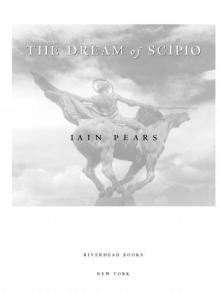 The Dream of Scipio
The Dream of Scipio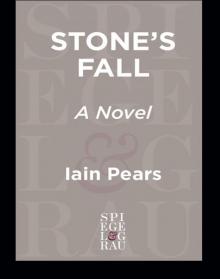 Stone's Fall
Stone's Fall The Last Judgement
The Last Judgement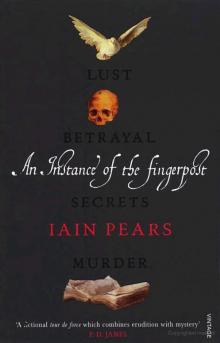 An Instance of the Fingerpost
An Instance of the Fingerpost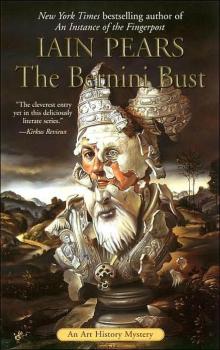 The Bernini Bust
The Bernini Bust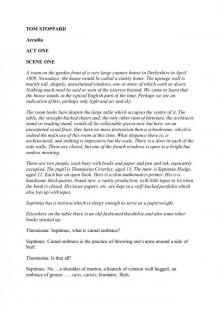 Arcadia
Arcadia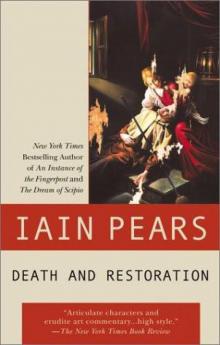 Death and Restoration
Death and Restoration The Raphael Affair
The Raphael Affair The Titian Committee
The Titian Committee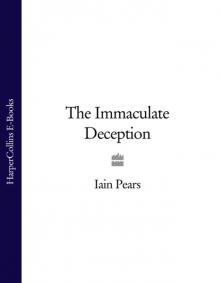 The Immaculate Deception
The Immaculate Deception Giotto's hand
Giotto's hand The Portrait
The Portrait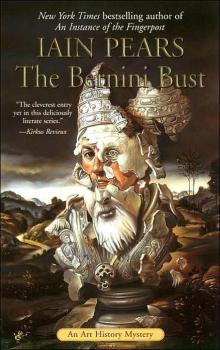 The Bernini Bust ja-3
The Bernini Bust ja-3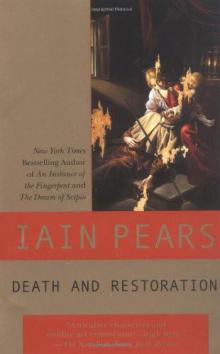 Death & Restoration ja-6
Death & Restoration ja-6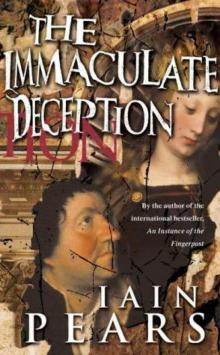 The Immaculate Deception ja-7
The Immaculate Deception ja-7